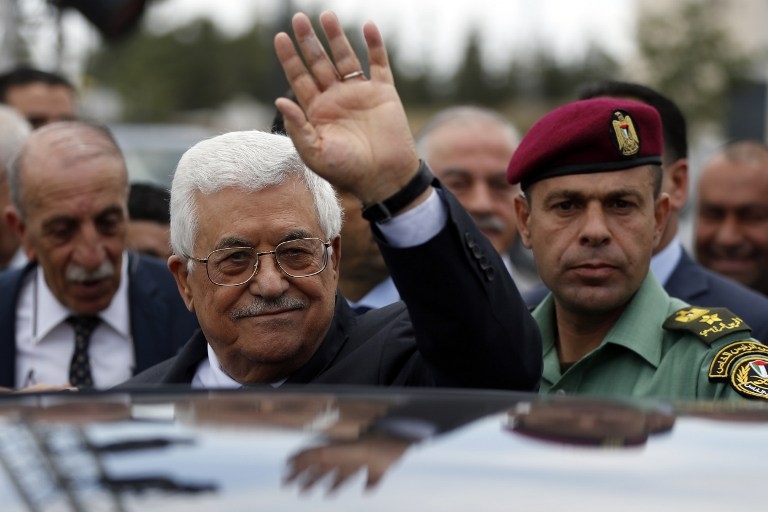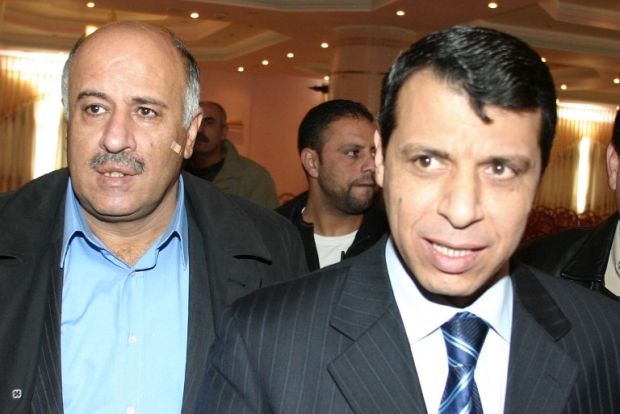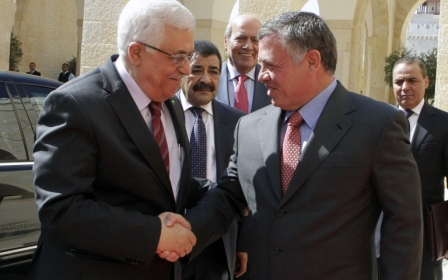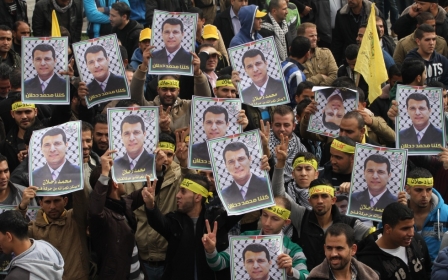The race to replace Abbas: Jordan, Egypt push Palestinian succession plans

RAMALLAH, West Bank – Jordan and Egypt have been contacting Fatah officials to begin planning for the era that will follow the leadership of current Palestinian President Mahmoud Abbas, Middle East Eye can confirm.
Confirmation from Palestinian and diplomatic sources comes after MEE revealed the existence of a plan by Jordan, the United Arab Emirates and Egypt that would see Abbas’s Fatah arch rival Mohammed Dahlan oust him.
The sources also say the exiled Fatah leader has been moving from one Arab capital to another, talking to officials, reaching out to Fatah activists and leaders with one mission: preparing the stage for the post-Abbas era.
Dahlan has been working on this mission for a long time, but has recently increased and broadened his connections, taking advantage of local and regional politicians who are concerned that, at 82, Abbas could die at any moment.
In his wake, sources say they fear he could leave behind a Palestinian Authority in disarray.
Egyptian and Jordanian officials have been in touch with PA and Fatah officials, including the party’s Central Committee members, to discuss succession plans, the sources said.
The officials are not only concerned about Abbas’s age, but are also unhappy with some of his political positions, the sources said.
Egypt is unhappy that Abbas rejected an attempt last November by President Abdel Fattah al-Sisi to reconcile the Palestinian president with Dahlan. Jordan is frustrated more generally that Abbas has not consulted the kingdom more closely.
Palestinian officials, even those close to Abbas, are talking with the Jordanians and Egyptians largely out of political necessity, particularly in the case of Jordan, the country through which the leadership transits to the outside world.
A senior Fatah official said: “We understand the Jordanian and Egyptian approach. They are concerned that Fatah leaders might not agree on a successor to President Abbas and fight each other over power.”
“Jordan, in particular, is very concerned that the West Bank might fall into chaos if a succession battle erupts between the rivals and then the PA could collapse and people might move to the kingdom.”
He added: “And it is no secret that Jordan and Egypt would like to see a Palestinian president that can fit with their policies.”
Movement within a movement
Abbas is the last founding member of the Palestinian Liberation Organisation in power. He spends much of his time travelling and has focused largely on foreign policy and efforts for Palestinian statehood to be recognised.
His successor is expected to turn his attention to pressing domestic issues, including the weak Palestinian economy, tensions between Gaza and the West Bank, the lack of a functioning parliament and regular elections and corruption, among many others.
Jordan and Egypt have cool relationships with Abbas. Jordan has complained that Abbas is not briefing them about his steps and, in many cases, hasn’t listened to their advice, particularly on the resumption of peace talks with Israel and in his pushing for resolutions at the UN.
In recent years, Dahlan has appeared as a strong player for the post-Abbas era. He enjoys strong financial support from the United Arab Emirates, particularly from the Sheikh Zayed charity fund.
Dahlan uses the money to support Fatah activists and their circles in refugee camps in Lebanon, the West Bank, the Gaza Strip and Jordan, a traditional Fatah way of gaining political support.
Generous Emirati financial support has also enabled Dahlan to form his own movement within Fatah, which has a similar hierarchy to the political party, Dahlan’s aides told MEE.
“We have a Central Committee, Revolutionary Council and branches,” one aide said.
“We hold regular meetings for the different levels and have activities and budgets, and this enables us to have an influential role within Fatah.”
“We are not going to split [from Fatah] in any condition, but we found out that the best way to have influence in Fatah is to be systematic and organised,” he added.
Power positioning
The rise of Dahlan has concerned many circles within Fatah, particularly those around Abbas and another Dahlan rival, Jebrel Rjoub, who says he will never let his enemy return to the party.
In private conversations with friends, Rjoub says Dahlan has been fired from Fatah and the only way for him to return to Palestinian politics is to form a new political movement.
But others say Rjoub will be pressed to change his mind the moment Abbas is out of power.
“The day after Abbas, Rjoub will receive phone calls from Egypt and Jordan and they will ask him to open a new page with his brother Dahlan,” a Fatah official said.
He added: “The same will happen with the security leader Majid Faraj and Azzam al-Ahmad and the rest of the prominent players in Fatah.”
Rjoub and Dahlan, who are both Fatah Central Committee members and seemingly the strongest leaders in the party, know that neither of them are likely to become the next Palestinian president initially, but will instead try to win the loyalty of the transitional leader.
In private discussions, Dahlan says if Abbas goes, he [Dahlan] would nominate Ahmed Qureau, the oldest Fatah leader in the PLO, who served as prime minister under Yasser Arafat, to be the successor.
A Dahlan aide said: “Qureau is not the perfect candidate for them, but the situation is not perfect either.”
Observers, however, say Qureau’s health is no better than Abbas’s.
Perhaps the strongest potential post-Abbas contender whose name has been floated recently is Nasser al-Qidweh, nephew of the late Palestinian leader, Arafat.
Qidweh stands firmly in the middle ground. He was against firing Dahlan, maintains good ties with Rjoub and would be accepted by all rivals in the Fatah camp.
Sources told MEE that Egypt and Jordan think Qidweh is likely to be the winner in the succession race and is the initial leader, leaving Rjoub and Dahlan to battle for his support.
Palestinians sources in touch with the officials in the neighbouring countries say they know it would be hard to market Dahlan at this stage, suggesting that Qidweh may be a transitional president.
The only problem Qidweh would face in the succession process is competition from Palestinian leader Marwan Barghouti, who has been in prison in Israel since 2004.
For years, Barghouti’s inner circle have maintained that he will run for the presidency in any future elections, regardless of the Fatah Central Committee's position, and regardless of whether he stays behind bars.
Those close to him say Barghouti has the right to run for the presidency because he enjoys the highest popularity among Palestinians in any public survey and is the only party leader who could win future elections.
Marwan – whose aides said he would run the PA from behind bars by appointing a series of deputies - has also said he believes that his election is the only way to maintain international pressure on Israel to release him from jail.
But observers say the PA is not going to have elections when Abbas leaves power. Instead, they expect Fatah leaders to freeze the elections on the pretext of the split between the West Bank, which is ruled by Fatah, and Hamas-controlled Gaza.
Abbas recently formed a constitutional court that many legal experts say may be an attempt to put a stop to elections after he leaves power.
In place of an election, the court could refer the PA to the PLO to install its president and deputies, if Abbas were to go at a time when free elections are not possible, legal experts say.
The court could argue, for example, that elections were impossible if Fatah and Hamas had not yet been reconciled or if elections could not be conducted in East Jerusalem, which are both currently the case.
New MEE newsletter: Jerusalem Dispatch
Sign up to get the latest insights and analysis on Israel-Palestine, alongside Turkey Unpacked and other MEE newsletters
Middle East Eye delivers independent and unrivalled coverage and analysis of the Middle East, North Africa and beyond. To learn more about republishing this content and the associated fees, please fill out this form. More about MEE can be found here.





